“You’re losing your hair? Well, it’s genetic.” This is what most people hear after asking a medical professional what causes hair loss.
While there’s absolutely truth to this statement, learning that hair loss is genetic often makes people feel as if going bald is also out of their control. But this couldn’t be further from the truth.
While certain genes may predispose men and women to hair loss, not everyone with these genes will go bald. And even if you’re thinning and have hair loss-related genes, it doesn’t mean that baldness is your genetic destiny.
Genetics & Hair Loss: Fact Or Fiction?
After my hair loss diagnosis, every medical practitioner I ever consulted told me I was losing my hair because of my genes. Even my physician said that while drugs like Rogaine or Propecia may slow or reverse some hair loss, there’s not much I can do (short of a hair transplant) to completely reverse the process. In other words, it’s inevitable. It’s unstoppable. As my former barber explained to me, “You can’t fight genetics.”
So, is the assumption that baldness is caused by your genes true?
Twenty years ago, the answer was yes. At that time, medical professionals agreed that your genes – or the DNA your parents pass on to you – determine all of biology (from how tall you are to how much hair you have). And since genes “run in the family”, if your father had a heart attack, you’re genetically predisposed to heart disease. If your father lost his hair, you’re genetically predisposed to baldness.
For instance, studies show a clear relationship between certain genes and hair loss. If we have this genotype, we’re twice as likely to go bald. If we’re really unlucky and have this genotype, we’re seven times more likely to bald. If we have both genes? We’re screwed. Or at least that was the assumption.
Today, researchers have continued to make progress identifying sets of genes closely associated with the balding process. At the same time, the gene-hair loss argument isn’t nearly as straightforward as scientists had once hoped. In fact, newer research is now helping rewrite much of what we thought we knew about the relationship between genes, disease states, chronic conditions… and even our hair.
It all began with The Human Genome Project.
Genetic Destiny: The Human Genome Project
In 1990, a series of international research teams began working on a multi-year, multi-billion dollar research collaboration: The Human Genome Project. The objective: to identify and quantify every single human gene. The rationale behind its funding: One major scientific assumption, and one major scientific promise.
The assumption: our genes are the root cause of our cancers, autoimmune disorders, and chronic conditions.
The promise: if we map every single human gene, we can identify the genes that trigger diseases like multiple sclerosis or Parkinson’s. If we know which genes cause disease, we can develop technologies to “delete” those genes and then prevent them from ever happening.
It’s no surprise that the US spearheaded this research project. Over 130 million Americans – or 45% of the entire US population – suffer from chronic diseases. Chronic conditions are responsible for seven out of ten American deaths. They account for over 80% of all US hospital admissions. And every 30 seconds, an American-based doctor amputates a limb as a consequence to one of the country’s most common ailments – diabetes.
Why wouldn’t a disease-ridden nation support a project with such potential? Why wouldn’t this nation want to be at the forefront of these discoveries?
The Human Genome Project’s expectations could not have been higher. Whereas mice have about 20,000 genes, scientists speculated that humans, due to their complexity, would have seven times that amount – 140,000 genes. Once all the genetic triggers of cancers, autoimmunity, and even autism were mapped, we’d begin creating technology to “turn off” those genes and paint a disease-free future.
Thirteen years later, the project was completed. What were the results?
The Human Genome Project’s Promises Fall Flat
The discoveries stemming from the Human Genome Project were puzzling at best, and disappointing at worst.
For one, scientists uncovered that humans don’t have nearly as many genes as we thought. In fact, humans have just about 20,500 genes. Shockingly, we have only 300 unique genes that distinguish us from a mouse.
But the most surprising discovery was that, despite mapping our entire human genome and identifying some genes linked to disease, nearly all gene variants posed a minimal risk for disease development. In other words, the root cause of most disease was not genetic.
Some genes are associated with disease, but most genes do not cause disease.
Intriguingly, researchers also discovered that our genes weren’t so “one dimensional.” Many genes actually serve multiple functions. They don’t have single-purpose relationships with specific processes – like cancer development or metabolism. If we delete a disease-linked gene, we might never develop that disease, but we might also impair our digestion, brain function, or even immunity. For example, the gene mutation that causes sickle cell disorder also protects people from malaria. Sickle cell disorder is more common in malaria-ridden regions, and many researchers believe this mutation actually helps sufferers survive to adulthood and reproduce, even if the disease shortens lifespan overall.
In short, the Human Genome Project failed to fulfill its promise, but it was still undeniably important. It forced researchers to revise one major scientific assumption…
Genetics do not determine all of biology. Our genes are not always our destiny.
In fact, new research speculates that 70-90% of disease risk isn’t genetic. It’s environmental.
My DNA Test For Hair Loss: 23andMe
Early in this article we mentioned a few genes associated with hair loss. There are actually a lot more. I would know. I seem to have most of them.
In 2015, I decided to discover more about my genes. So I went and got my entire human genome sequenced through a service called 23andMe.
This is how it works: 23andMe mails you a vial. You fill that vial with saliva and mail it back to their lab. 23andMe processes your vial, decodes your human DNA, and sends you back the raw data. The company also provides you with “fun” add-on services – like what percent of Neanderthal you are, where your mother and father come from, if you have any relatives in their database, or if you have any life-threatening genetic variants (that one’s not so fun).
I was more interested in finding out what my raw genetic data said about my potential to develop disease. Specifically, I wanted to know, based on my genes, how likely I was to go bald.
So I uploaded my 23andMe data into a company called Promethease. Promethease cross-references your DNA with all the published studies about your genotypes, then sends you an automated 100+ page report. The report tells you everything from how well you methylate B-vitamins to how quickly you detoxify drugs to your genetic predisposition for certain cancers.
So how did my raw DNA compare to all the studies on genotypes and male pattern baldness?
My Genes & Predisposition To Hair Loss
Here’s a readout of how my DNA stacked up versus all the genotypes linked to hair loss.
Let’s start with the good news. I have one genotype that says I have a reduced risk for baldness:

So far so good! (For anyone who’s curious, you can read the study about that genotype here.)
Now for the bad news.
I have ten other genotypes linked to hair loss. Each one of them increases my risk for balding.

And now for the worst of my genotypes… A 1.6x increased chance for baldness, followed by a 2x increased chance for baldness…

…followed by an increased risk to go completely bald before 40…

…followed by the worst genotype of them all… a 7x greater risk for baldness.
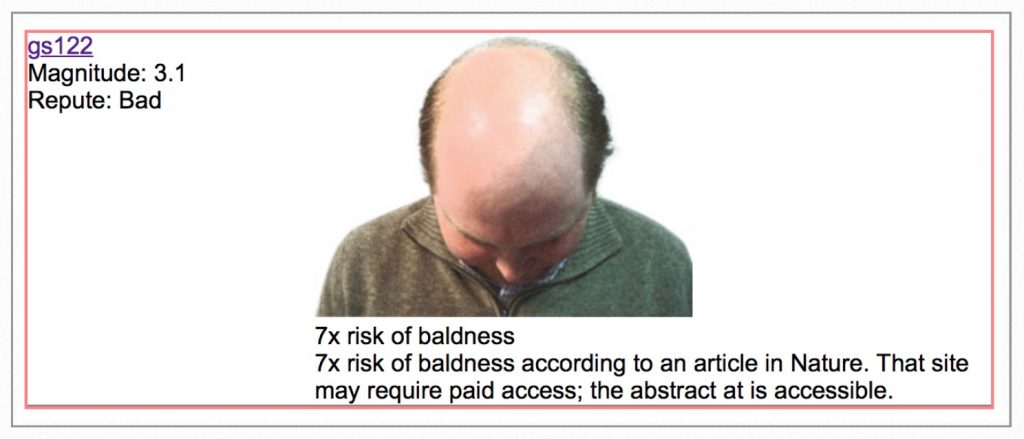
A seven times increased risk for balding! Remember those hair loss genes referenced earlier in the chapter? I have both. Based on my DNA, I’m screwed.
And then there’s the mounting physical evidence.
Most Men In My Family Are Slick Bald
My mother’s father is bald. My mother’s brother is bald. My father’s father was bald. My father’s brother is bald.
And then there’s my hair loss medical diagnosis…
My Hair Loss Medical Diagnosis
I started noticing hair thinning at age 15-16. A few months later, a doctor diagnosed me with male pattern hair loss. Here are his notes from our consultation:
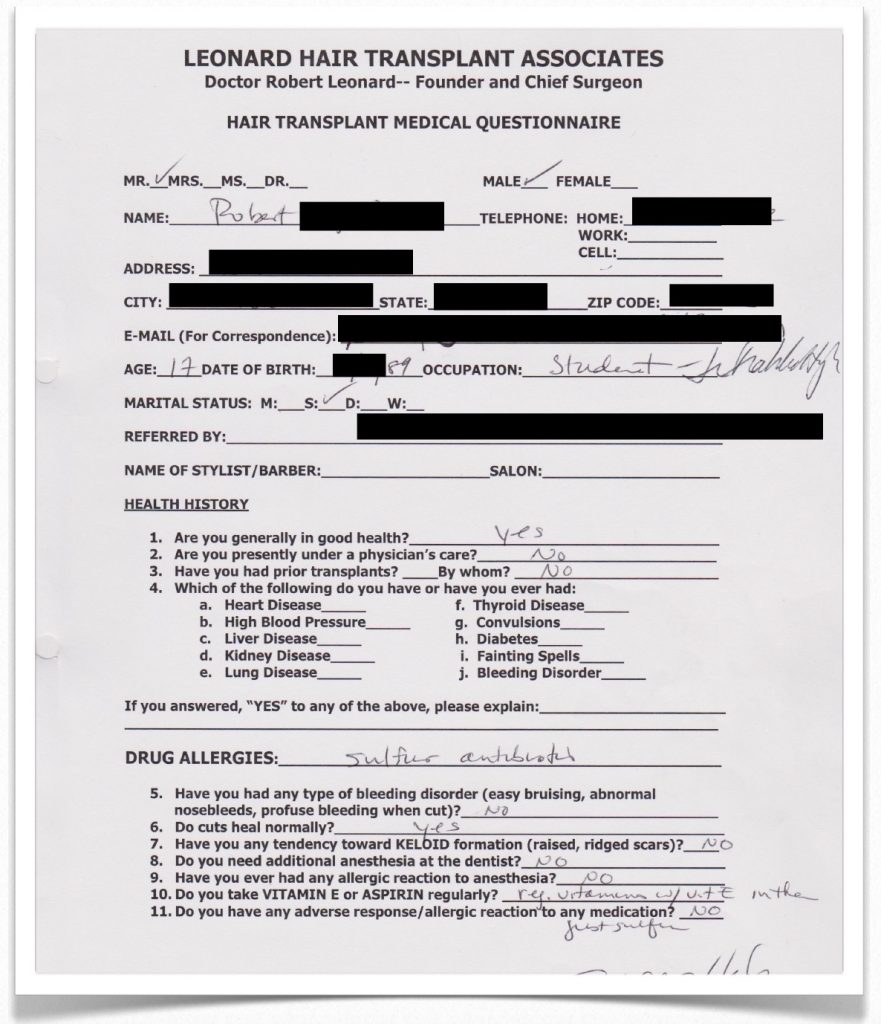
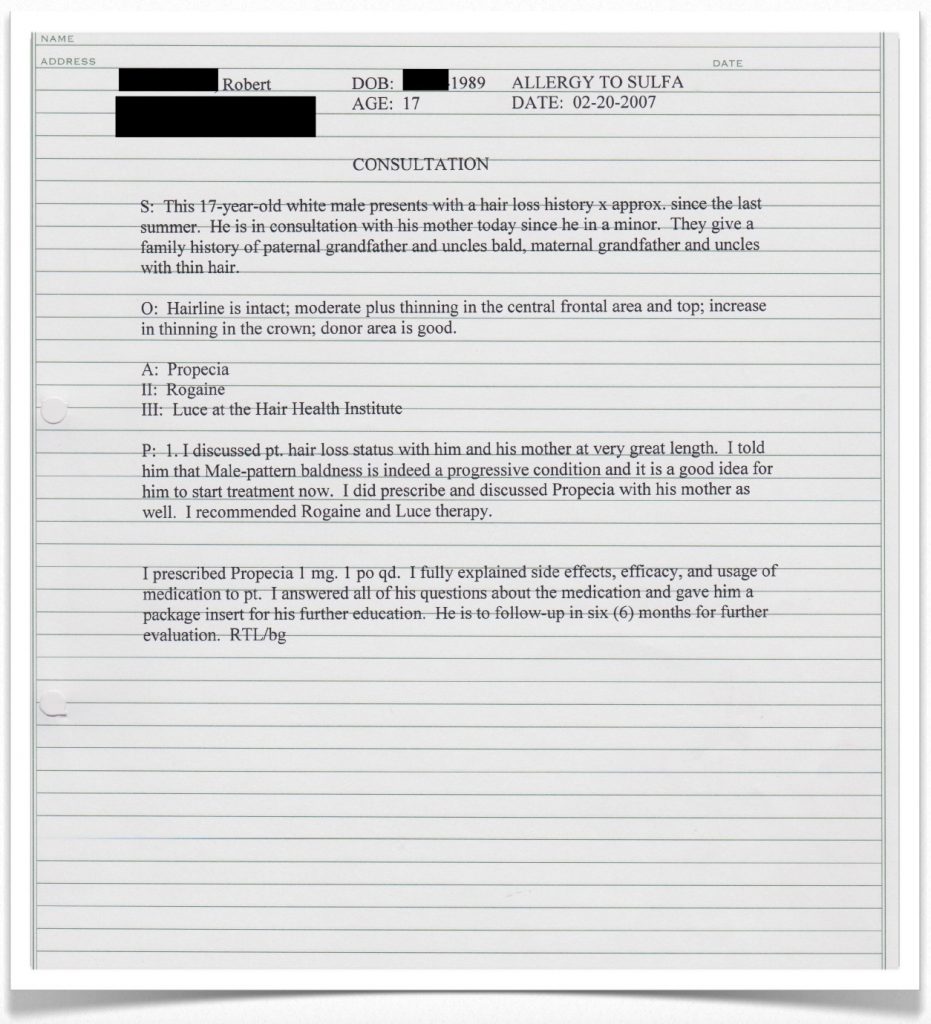
Soon after the diagnosis I picked up a bottle of Rogaine and started an eight-week trial of low-level laser therapy (Luce therapy). While I never followed through with taking Propecia, I ended up taking Rogaine for ~6 years even despite my continued thinning (see my photos).
Now let’s review the facts:
- According to my DNA data, I have a genetic predisposition to pattern hair loss
- At 17 years old, a medical professional diagnosed me with male pattern hair loss
- My 2011 and 2012 photos show clear thinning at the vertex
In other words, my DNA data, diagnosis, family history, and photos all suggest that baldness is my genetic destiny.
And yet today, I’ve still maintained most of my hair. And while I’ve managed to do this without FDA-approved drugs, clinical evidence we have from treatments like minoxidil and finasteride all strongly suggests that long-term maintenance of hair is possible – even when you’re up against genetics.
How is this possible? Well, it turns out that while we can’t change our genes (yet), we do have the power to turn genes “on” or “off”. Researchers now believe disease development has less to do with our genes, and more to do with which genes our body actives or deactivates. This is called gene expression – or when our cells turn combinations of genes on and off to perform certain functions.
Epigenetics has significant relevance to hair loss.
Beyond Genes: Epigenetics
There’s an entire field of study exploring the factors that influence gene expression: Epigenetics. Epigenetics has revolutionized our understanding of disease prevention, pathology, treatment, and reversal.
To understand the potential of epigenetics, let’s look at a few examples of just how easy it is to change gene expression, and just how transformative those changes can be.
We’ll start with agouti mice – a mouse breed once believed to be destined to a life of obesity due to their genes. Then one experiment changed everything.
Epigenetics Breakthrough: The Agouti Mice
Is it possible to stay 100% healthy even if your genes “relegate” you to a life of disease? In the early 2000’s, researchers set out to uncover the answer.
They set up an experiment with a certain type of mice called “agouti” mice. Agouti mice are genetically doomed. They have a mutation in what’s known as the “agouti” gene – a gene that determines fur color. Normal mice vary in color from brown to black. But this mutation makes agouti mice yellow.
But they’re not just yellow. One look at these photo and you’ll notice something else:
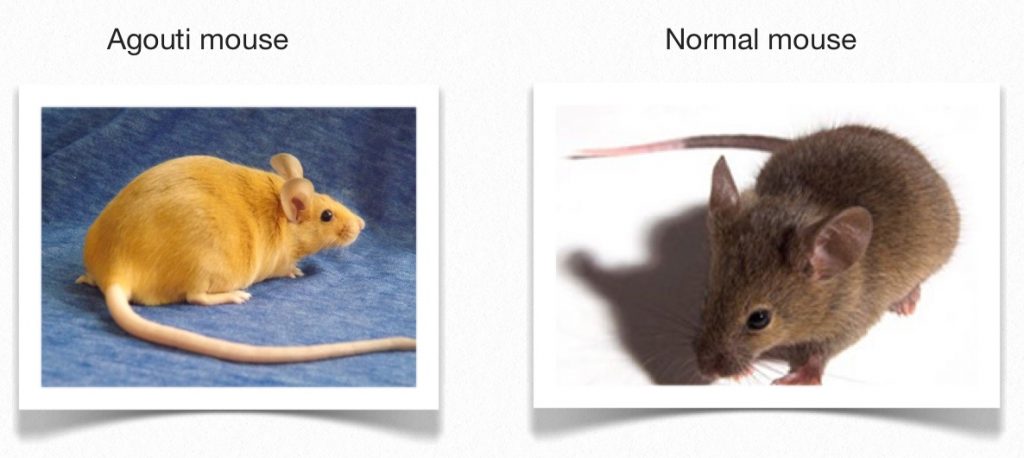
These agouti mice are also obese, ravenous, and far more likely to die prematurely from heart disease, cancer, and diabetes. It’s a mutation that, in extreme cases, is known as a “lethal allele” – a gene variant that causes early death in the animals that have it.
You can’t change your genes. So does this gene guarantee agouti mice to a life of disease?
Researchers decided the best way to answer this was to see if they could influence the agouti gene’s behavior.
The team believed that if they could give mega-doses of certain nutrients to an agouti mouse during its early development (ie: while it was still inside the womb), then maybe those early nutritional gains would help the mouse live longer. Agouti mouse would still be born yellow, but maybe they wouldn’t be so overweight or die so young.
So they split up their agouti female mice into two groups, fed them each two different diets, then impregnated them.
Two Mother Groups, Two Different Diets
One mother group was fed a standard lab rat diet. The other mother group was fed a diet rich in vitamin B-12, folic acid, betaine, and choline for two weeks before and during their pregnancy. The females were mated, and twenty days later, each group was ready to give birth.
This was a longevity study. It would take years for researchers to track each baby’s weight, length, development of cancers, and finally their age of death. In short, no one expected any surprises during the birthing stage. But that’s just what happened.
A Birth Of Surprise
When these agouti mothers gave birth, researchers discovered two things:
- In the group fed a lab rat diet, the babies were born yellow and fat (as expected).
- In the group fed a nutritionally rich diet, the majority of babies were born brown. And skinny.
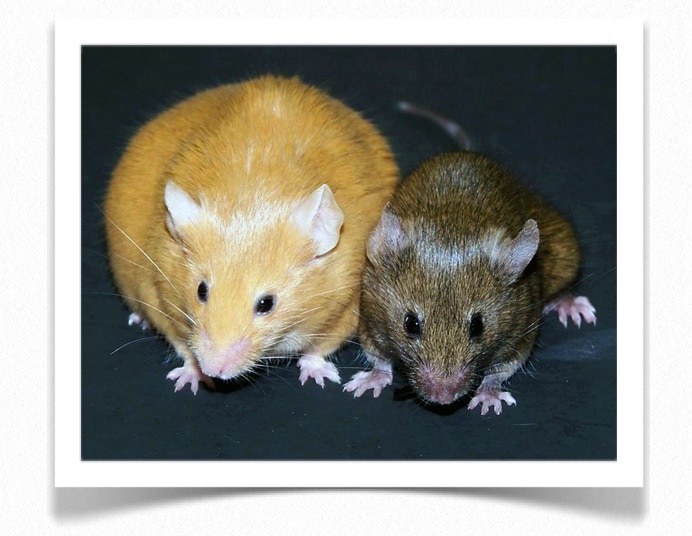 (source)
(source)
These siblings are genetically identical. How can they look so different?
The Agouti Mice Defy Genetic “Destiny”
The group of agoutis fed mega-doses of nutrients defied genetic destiny. They were supposed to be born yellow and overweight. Instead, they were born brown and skinny – just like mice without the agouti gene mutation.
How is this possible? The agouti gene is unchangeable. It destines agouti mice to be yellow and fat. “You can’t fight genetics,” as my barber said.
Except you can. Here’s something doctors don’t mention about genes: they can become activated or inactivated. That’s what Epigenetics is – the study of gene expression. And this agouti mouse study was a breakthrough. Why? It proved we could control gene expression. We can turn off the gene that makes mice yellow and fat… using only better prenatal nutrition.
This is possible through a process called methylation.
Gene Expression & Methylation: Why Our Bodies Turn Genes On And Off
Before conducting the agouti mice study, researchers uncovered that the agouti gene – the gene responsible for agouti mice’s yellow coat and obesity – was “unmethylated”. What does that mean?
It means in the yellow mice, the agouti gene was always “turned on.” It was always activated inside the mouse’s cells.
Researchers also knew that methyl donors – compounds found in certain foods – could potentially “methylate” certain genes – or turn them off.
How Does Methylation Alter Genes Expression?
To put it simply, inside every cell is DNA, and inside DNA are genes. When we eat food, our cells break down that food for energy. If that food also contains methyl donors, those methyl donors will also enter our cells and leave behind small chemical tags on top of our DNA. These chemical tags tell the cell which genes it should turn on or off.
An unmethylated gene is active – or turned on (upregulated). A methylated gene is turned off – or inactivated (downregulated).
For a fascinating overview, see this flowchart.
These researchers thought that if they fed pregnant agouti mice enough methyl donors, maybe those methyl donors would “methylate” the agouti gene, and in doing so, dim the gene’s effects on the mother’s babies.
They did, and beyond all expectations.
The diets high in methyl donors not only methylated the agouti gene, they turned it off completely. What’s even more interesting, when those brown, healthy agouti offspring reproduced, they passed down their coat color! Their babies were also brown.
These results changed our understanding of genetics forever. Even before the Human Genome Project was complete, another research team had already rewritten its biggest assumption. You can control your gene expression. Genes might be your body’s blueprints, but genes do not determine your destiny.
The researchers published their study in 2007, and within the year, interest exploded in what is now known as Epigenetics – the study of the factors that influence our gene expression.
It turns out these factors extend far beyond the prenatal nutrition of agouti mice.
Gene Expression – Out Of The Womb, Into Your Control
At birth, identical twins’ genes are the same, and their gene expression (which genes are turned on and off) is nearly identical. But as twins age, their active and inactive genes begin to diverge. And by adulthood, their gene expression looks nothing alike. Some researchers believe these differences are why one identical twin can develop disease while the other twin remains unaffected.
Even more interestingly, new research suggests that epigenetic differences may explain why one genetically identical twin can bald faster than the other. Here are two more studies here and here.
So what are the factors that influence gene expression and contribute to disease development… or disease prevention?
What Influences Gene Expression?
The short answer is everything. Let’s start with the bad:
- Acetaldehyde – a byproduct created when our bodies process alcohol – can inhibit enzymes that regulate gene expression and normal cell function. In some tissues, like the brain and the liver, too much acetaldehyde exposure can even damage DNA.
- Tobacco smoke can activate genes in the mouth that are associated with cancer development. And for some people, these genes stay turned on even years after quitting. This partially explains smoking’s cancer and survival rates.
- Long-term sleep deprivation – through all-nighters or consistently under-sleeping – activates and deactivates genes that control inflammation, thermoregulation, and energy breakdown. The result: increased inflammation, a decreased body temperature, and a slower metabolism.
The list goes on… But now for the good:
- Practicing meditation, mindfulness, and deep focus influences gene expression in our brain, and over time, can grow the brain’s gray matter, hippocampus, and orbito-frontal cortex. It can even lengthen telomerase – an enzyme associated with longevity – in breast cancer survivors.
- Our gut bacteria – the organisms inside our intestines that aren’t human – feed off food we ingest, and then produce enzymes as byproducts. These enzymes create a mutually beneficial relationship with our human cells. They alter our intestinal gene expression to enhance the breakdown and absorption of fats, carbohydrates, vitamins, and minerals. In fact, without these bacteria, we cannot survive long.
- Exercise upregulates (activates) genes in muscle tissues that help with glucose utilization and inflammation. The more you exercise, the stronger this gene expression, the more efficient a muscle becomes at using glucose, the quicker that muscle recovers from inflammation. Moreover, regular exercise upregulates genes that trigger brain stem cells to make new neurons, even growing the size of the brain itself.
Here’s an infographic:
As we can see, the factors influencing our epigenome are extensive. Anything from the air we breathe to the foods we eat to the amount we sleep can change which genes our bodies upregulate and downregulate.
Which brings us to an important question…
Can we influence our gene expression to arrest or even reverse pattern hair loss?
Yes. Researchers have even demonstrated this in identical twin subjects.
Take this study measuring one-year outcomes of genetically identical twins – one using the drug dutasteride (an off-label treatment for hair loss); the other doing nothing for their hair. The one seeking treatment improves their hair loss; the other continues to experience hair loss.
Or take this long-term outlook from two balding twins – one who used dutasteride for years to manage hair loss, the other who hadn’t. The former retained most of their hair; the latter continued to go bald.
In these cases, dutasteride and/or finasteride lowered levels of DHT, a hormone that is causally linked to pattern hair loss. By lowering DHT, these participants most likely decreased the genetic expression of a signaling protein called transforming growth factor beta 1 in dermal papillae cell sites (i.e., the “powerhouse” of the hair follicle). The end-result? A slowing, stopping, or partial reversal of pattern hair loss.
This is just one example of how drugs can influence our own gene expression to improve pattern hair loss. There are many others – including speculation from treatments that aren’t drug-related (like low-level laser therapy or microneedling). But that’s far another article.
For now, what’s important is that gene expression – and our ability to change it – is the basis for what makes hair regrowth possible.
So, the next time your doctor tells you that hair loss is genetic, please don’t feel helpless.

Rob English is a researcher, medical editor, and the founder of perfecthairhealth.com. He acts as a peer reviewer for scholarly journals and has published five peer-reviewed papers on androgenic alopecia. He writes regularly about the science behind hair loss (and hair growth). Feel free to browse his long-form articles and publications throughout this site.

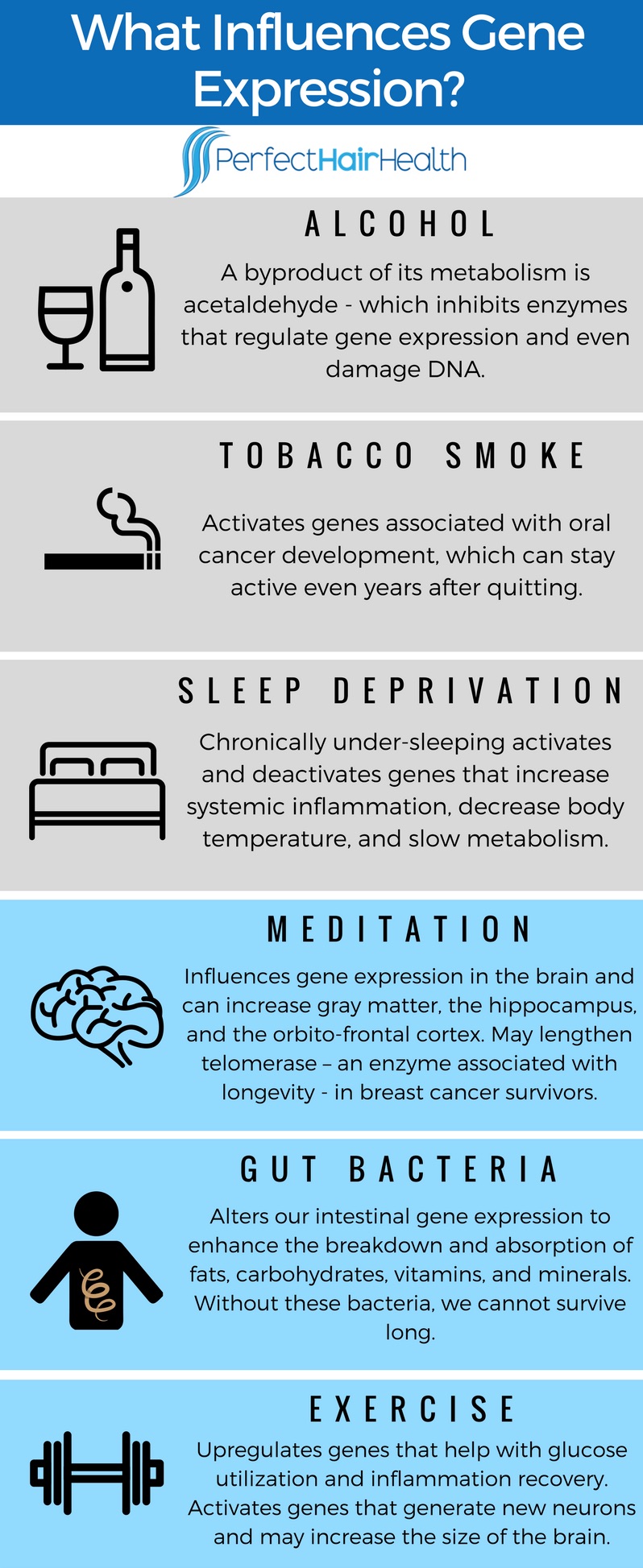
Rob , Interesting article.
According to Rei Ogawa mechanical stimulation changes Gene expression.
are we talking about a matter of months before Gene expression changes? How often does this occur.
And im seeing changes in Hair quality since doing the messages. Im three months in, and it looks feels more dense. No longer greasy and dead. However No re-growth( only three months) , but definite positive change in quality look. Wouldnt say complete thickness yet, but looks better than last month. Also skin is becoming much more elastic on vertex, frontal is also giving in. However ive lost ground on probably what was dead hair on the front.
Il keep you up to date.
Thanks.
Hey Praz – according to Rei Ogawa’s research, gene expression can change in a matter of hours. After 72 hours of continuous dermal papilla stretching, Ogawa and his team demonstrated thousands of genes expression changes. Obviously we can’t keep our scalps stretched all day long, but cumulatively the stretching exercises should help in the long-run.
Great to hear about your progress. I’d consider easing up on any areas where you feel like you’re losing ground. There’s no need to regress so long as you ease into the regimen slowly. Everything else sounds like you’re on track.
On the contrary – I’ve seen significant skin improvements from the diet outlined in the book. But in general, improvement depends on the kind of acne. If it’s acne as a result of small intestinal bacterial overgrowth – then a diet void of heavy starch or carb meals will help significantly. To adopt this to the book’s diet, just eat fewer potatoes / rice but still keep total calories the same (avoid a deficit). If your acne is hormonally-driven, then the diet outlined in the book should help as-is.
Rob I need your advice. About tho months ago my doctor who is actually both doctor in chinesse medicine and west medicine instructed me to using something like Zhangguang 101. This person came from china by the way and claims that this product have very good results. I am using this product with massage since 2 month. It’s too short time to see any result but do you have any knowledge about this products ? Remember that I am talking about Zhangguag, not Fabao, fabao is a scam.
Rob
I’ve just read some information on sulfarphane.
Seems promising. But would a supplement be enough ? And should this be categorized like a DHT blocker IE saw palmetto ect
Hi Kuba, I’m from China, Zhangguang101 is well known for promoting hair growth for a certain period in China, but it is then discovered to contain minoxidil inside, most Chinese medicine doesn’t help much in hairloss, at least in the short term, because chinese medecine is hard to explain with science, may be there will be something can really help improve hairloss in the future for chinese medicine, but for now, Zhangguang 101 would be nothing different from minoxidil.
Hey Rob..A brilliant article regarding gene expression nd balding.
Can you please advice regarding one thing. Regarding microbiome, nutrition, gut flora & gene expression can all these years of eating inflamotory food could have diminished the good gut microbial counts? And in this regard will a good probiotic and/or fermented foods/veg be beneficial for restabilising the proper gut biome..
Great points. It’s been shown that different diets encourage different populations of gut flora, with stark differences observed in vegans versus standard american diets versus paleolithic diets versus fasting-related diets. A probiotic / fermented foods can help mitigate or even restore damaged or missing flora due to years of poor dieting. But unfortunately 99% of probiotics on the market are scams. They’re over-priced, don’t have a high enough bacteria count, and sometimes the bacteria are often dead-on-arrival due to poor shipping regulations and heat exposure.
The best probiotic I’ve ever tried has been VSL#3. And it’s hard to come by. But it’s one of the few that have been clinically studied and shown to improve gut health in those with compromised immune systems.
Hey guys I have a question. I’m a bodybuilder, (especially I like powerlifting) not like a gym rat but I go for 1 hour of workout once in 2 days. As I realize more and more balding bodybuilder I become getting anxious 😀 Do you think that there is a relation between balding and hair loss, or is it balding guys tend to develop their body more because of losing confidince caused by hair loss?
Another short question too then Rob 😀
I think I’m a stressed guy generally, I have overthinking problem 😀 I examine people, things, events around me too much and think about them. I assume that I probably have chronically increased cortisol levels. (Also, all my hair loss cascade started during a very very high stress period. I had ocd, thoughts that always stress me immensely, and also I had to study hard for university. I lost very much hair in that 9 month period, people could easily say I was losing hair. It’s mostly recovered now after that, but I still have hair loss.)
Shortly, my question is do you have any recommendation to people who have chronically increased cortisol, and are we sure it causes hair loss?
Elevated cortisol is associated with increased shedding, and while there’s a debate between whether excess shedding is the same as pattern hair loss (I consider the two different), in general we want to keep cortisol in check. Here are just a few things that can contribute to chronically high cortisol levels:
1) Lack of sleep
2) Lack of sunlight
3) Caffeine
4) Alcohol
5) Stress
Dial those in! The triggers of high cortisol vary for each individual. But when it comes to common causes, those are top-of-mind.
Hi rob,
i was talking about DHT metabolites involved in baldness. Well, there are two prominent ones -> 3-alpha-diol and 3-beta diol.
http://meridianvalleylab.com/testosteron-metabolite-3b-adiol
I thought since it is anti-prostate cancer , may be there might be less breakdown of DHT in 3-beta-diol in balding scalps. Turns out i was wrong.
https://www.ncbi.nlm.nih.gov/pubmed/2091154
https://www.ncbi.nlm.nih.gov/pubmed/8104354
Or may be it’s higher quantity is present as a response to some other thing in the balding scalp.(Frankly i don’t know)
however, on its own , 3-beta-diol has very anti-stress, anti-anxiety effects when taken/inhaled at physiological doses(Source: wikipedia + people who have taken it).
I know people who have taken pure DHT yet didn’t get any hair loss. Some clinical trails which used DHT haven’t reported hair loss as a side-effect. May be downstream metabolites are the key here
Hey Dante – thank you. I’m looking into this more and will report back if I find anything worth sharing. Unfortunately, I don’t know if enough research has been done on metabolites to say with certainty that they’re a causative factor in balding. It’s certainly possible. If I find something, I’ll send you an email right away.
Hi Paola – I’ve never seen anything in the scientific literature suggesting that hair growth slows due to massaging (or any mechanical stimulation). It certainly hasn’t been the case with me. Best, Rob
Hey Kuba – try decreasing your intensity or taking a day off. Conversely, you can also try an oil (emu, coconut) and even apple cider vinegar to see if that helps alleviate some of the dryness.
Hey Rob, I was just wondering why you don’t recommend bottled water in your book. And also what’s your opinion on like tuna in a can as opposed to like sardines or oysters. Thanks!
Hey Wyatt – thanks for reading. When I was an undergraduate student, my friend did a research project on the phthalate concentrations of water from major bottled water brands. Companies like Poland Springs had recently transitioned to a more “eco-friendly” packaging – meaning thinner, flimsier plastic to save on materials, and we’d yet to know how this would affect the rates of plastic leeching. Her study’s results: all major tested water bottles had phthalate concentrations far beyond what was projected… especially for national/international brands that were shipped far distances in hot trucks (the heat likely increased the leeching). Bottom line: bottled water might sound better than tap, but it’s got its own problems worth avoiding. I use tap water + an activated carbon filter.
RE: canned tuna / oysters / sardines — my advice is to always opt for fresh. If you can’t get it, then just be sure the manufacturer from whom you buy your canned goods isn’t lining their tins with BPA, etc.
Hello Rob.
I was reading one of your articles recently about stopping the use of shampoos and conditioners.
As someone with medium-long hair at the moment I’m interested in keeping it for as long as possible and this definitely caught my attention.
Right now, I’m shampooing/conditioning twice a week. I used to shampoo/condition once a week but found my hair to get sort of limp and heavy by the end of the week so I decided to increase the frequency of my washings. On the days that I don’t wash my hair, I use coconut or argan oil to control frizz.
My questions are:
1). Do you think washing twice a week will increase the likelihood of thinning/balding? I like my current routine very much and I believe I’ve found my personal balance when it comes to the frequency of washing/not washing.
2). Do you think shampoo/conditioner quality makes a difference? I’ve done my boatload’s share of research into what brands are good what brands are bad (mostly asking around on forums) and what ingredients to look/avoid. I would like to think I’m using some fairly high quality products but I don’t know if this makes any sort of difference.
3). Do you think the use of oils has any effect on any of this? Like would coconut oil make the hair more brittle or clog the pores and cause thinning, etc. I would like to note that I do not apply the coconut/argan oil to my scalp but rather to the mid-shaft and ends of my hair.
Thank you very much, I will be buying your book in the next few days and I look forward to making changes in my diet and lifestyle so that I may have a higher chance of keeping flowy hair into later life.
Regards, Ivan.
Thanks for reaching out Ivan. To answer your questions–
1) It depends on each individual. The main concern with frequent shampooing / conditioning is that you’re constantly stripping your hair of its natural oils (sebum), and thereby likely increasing the production of sebum, which over time, will make your hair look greasier faster and increase your dependency on shampooing / conditioning. There’s some evidence that excess sebum is associated with increased hair thinning – suspected to be the result of certain microbial colonies that feed off sebum and in turn create inflammation. So in my experience, it’s best to keep sebum production within normal ranges – and for myself and others, that means we need to stop the sebum overproduction cycle by quitting shampoos / conditioners.
2) Quality does make a difference. But in general, most major brands skirt quality control and use misleading wording to make someone assume a shampoo is devoid of problematic ingredients when it isn’t. For instance, after sodium laurel/laureth sulfate started getting some negative attention, many brands stopped including it and instead advertised “no sodium laurel sulfate!” Their replacement ingredient? Coco laurel sulfate. It’s essentially the same molecular compound, only derived from coconuts. It’s less studied than SLS, but likely produces the same effects.
3) Coconut hair might make the scalp and hair feel greasier, but it shouldn’t hurt hair quality or make your hair more brittle. On the contrary, most people report the opposite when they consistently use fat-based oils on their scalps (either as a leave-in nightly topical or even more sparingly – like application 20-30 minutes before showering).
Best,
Rob
Thanks for taking the time to answer.
If you don’t mind me asking, what’s your opinion on the theory floating around hair loss forums that excess body hair indicates how fast someone will lose their hair or if they will lose their hair at all?
I live in the UK currently and probably 70% of all men around me that I see with MPB barely have any hair on their body let alone an excess of it. I have also seen some that fit the “hairy body, hairless scalp” type but I haven’t really observed any pattern.
Do you think they’re related?
Thanks man, just bought your book gonna start reading now and start applying the knowledge within.
Based on the evidence, it should be preventive too. I wish I’d started them long before my hair started thinning… It probably would’ve saved me a lot of time and energy!
Ok, that makes sense.
Regarding iron levels, I recently had a blood test but I couldn’t see any iron levels on my results.
I had a red blood cell count, haemoglobin and haematocrit levels.
Would those be enough to find out my iron levels or would I need an additional test just for iron?
Hey Ivan – serum ferritin is likely your best indicator for iron stores:
http://www.irondisorders.org/iron-deficiency-anemia
Hi Rob,
I’ve a question that is, my father & ancestors are also bald. Even I m also going bald would any diet help me to regrowth of my hair. Can you suggest me because I have consulted many of doctor’s they prescribed finsteride tab and even I used sawplametto but here there was a answer with sawplametto I’ve took it for 4months it as worked great but doctor informed to stop it as it gives side affects like impotent.
So, can u please help me in this what diet and how to maintain. I was fedup with doctors and medicine’s.
Hi Kashyap,
Unless your hair loss is caused by stress or a nutrient deficiency (which is often the case with telogen effluvium), then diet will likely only be limited to slowing hair loss progression (or in some cases, stopping it). I’m happy to discuss your individual case and help create an action plan for you over a Skype consultation:
https://gumroad.com/l/phh-skype
Best,
Rob
Hey Sean,
Thanks for reaching out. There’s no need to go over blood work during the sessions — in fact, this is rarely done in sessions since there’s so much more to talk about. Sometimes, the sessions are used to advise certain blood / hormonal tests to figure out what else could be going on (ex: if there’s suspicion of SIBO, estrogen dominance, etc.). But there’s plenty else to cover in these sessions.
Best,
Rob
Hey Nate,
In general, a complete iron panel is required to determine if someone has iron overload — because the preliminary test (hemoglobin) you’ll do during a regular blood test just can’t tell you much. In addition, the interpretation of these results matter. Sometimes tests will read like “low iron” but a closer examination actually reveals low iron due to a pathogenic infection — in which case, if iron supplementation is given, it could be fatal.
I haven’t tried the new version of the keto diet yet! It’s still on my agenda, and plan on doing so this year. In general, I probably dip into ketosis regularly without knowing it — since I’ve lately been limiting my refined sugar and don’t eat grains anyway, which, alongside a daily workout, might frequently put me in a ketogenic zone (at least temporarily). But things feel good for now, so I’ve been reluctant to make major changes to the diet. I’ll be sure to keep you posted when that experiment happens!
Best,
Rob
Hi Bob,
I was looking through the article and have found many interesting information in it and would like to seek your advice.
I am an Asian Female and have notice falling hairs since I was 13 years old. Till now, I am 27 years old and the situation have gotten really worse where I think my hairs are not growing anymore. Before I resign myself to the harsh reality and due to DNA (My mom started to lose hair at a young age too), is there anything that I can do to regain back my hair? Or to slower the process?
Thank you so much.
Hey Rachel,
Have you tested for any of the following?
-Hypothyroidism
-Hyperparathyroidism
-SIBO
-PCOS
-Nutrient levels (namely vitamin A, D, B-12, zinc, copper, and iron)
Particularly for young women, these conditions are concomitantly associated with the onset of hair thinning. When they’re properly treated, most of the women with whom I’ve worked have reported an arrest (or reversal) of hair loss.
Best,
Rob
Hi Rob,
I’m a woman in her mid-30s and I’ve just been diagnosed with female pattern hair loss. My scalp biopsy reports shows “possibly lichen plano pyloris” and “suggestion of early concentric fibrosis around the hair follicles”. The final diagnosis on the report is “mild perifollicutlis present with possible early fibrosis”.
My dermatologist is pretty positive its actually early AGA which he has put down to my genes. All the hairs from my sample were terminal hairs with no predominance of telagen or vellus hair. No marked loss of hair follicles yet. So maybe I’m wrong but how did come to this conclusion?
I went to a functional doctor who ran tests and found me to be low in iron, vitamin D and B12. My oestrogen, progesterone and testosterone are all low and CRP serum levels are elevated. I wish it was just a case of telogen effluvium but the derm believes otherwise.
As for the genetic side of things, my mom’s side of the family do not bald but my grandfather and 2 uncles are completely bald
He hasn’t discussed why he’s come to this diagnosis but I recognise a lot of the terms on my report that you use on your site such as inflammation, fibrosis,etc.
He wants to put me on minodoxil. I still have a good head of hair but its gradually losing density and I’m afraid of the side effects of such a treatment.
Your techniques sound promising and safe/without side effects and I would love to try it but with the current recession in my country and the negative Rates of Exchange impact I’ll have to wait quite a while before I can afford to order your book.
I read your article regarding the balding gene and I want to share my family’s story to share with you how weird and complicated this whole hair loss thing has been for me.
As I mentioned before, my paternal grandfather and both my dad’s brothers are completely bald. My dad was blessed with a great head of hair most of his life but slowly developed typical male pattern baldness symptoms (mostly at the crown) in his late 50s. He took it in his stride thinking it was inevitable from his genes. A few years later he got sick and developed fibrosis of the lungs and was in a coma for a month. We watched in horror as all his remaining hair fell out while he lay there unconscious. But surprisingly a year later after his recovery he had regrown all his hair including on all his bald spots. He sadly passed away last year with a head full of silver hair. We never understood how he magically recovered from the hair loss which we all put down to “genes”.
I’m hoping for a miracle as I struggle with my own hair loss which I don’t even know how to treat as I don’t know what type of hair loss I actually have based on the above.
But I’d like to know your own thoughts regarding my own situation and my dad? Also how is it possible that a man who was clearly balding like his brothers and father could “reverse” the baldness by doing nothing? The only thing I can think of was that he was on a lot of anti-biotics to fight the infection in his lungs. Would this have helped in some way?
Also a second question, I suspect that if I have AGA, that the contraceptive pill may have triggered it. What is your thoughts on this? I’m using something a Pill which contains gestodene. Its known as a “light contraceptive pill” in my country. But the hair loss has been so gradual I can’t really tell when it may have started.
Thanks for reading my comments.
Hi Rob
I´m following your research with a lot of interest. You’re doing an amazing job there! I´m thinking of buying your book soon (I want to read all the articles in your blog first).
It seems like my hair is miniaturizing (I started having thinner hair on the sides and the back of the scalp & slowly the hair on the top is also getting thinner – not the typical pattern for women, I know) and I am terrified of passing this on to my kids if I´ll ever have any. I do not have any female baldness history in my family (but are bald men, including my dad), but still got this (due to epigenetics then?). I´m just wondering whether my kids would have a higher predisposition to develop baldness because in my case the gene went “on” due to “x” reasons. I know there are a lot of genes involved, but taking the mice example, I would in principle not pass it if I managed to turn the baldness genes “off”. 🙂 I know it’s not that simple but I´m wondering how you see this.
Thanks so much for your views and keep up with the GREAT work!
Georgia
Hi Georgia,
In the field of upregulating and downregulating genes, upgrading your body system program, you should studie Joe Dispenza work and meditations.
Hey there. I’m pretty desperate, and have definitely spent many years googling “how to prevent hair loss” until 3am. I’m a 26 year old female and feel as if I’ve tried everything. I signed up for your book! I’m just wondering if there are any other tips or points you can share? I’ve lost almost all of my hair by this point, and it’s pretty devastating. I know I’m doing something to trigger it, but I can’t figure it out.
Hi, I just want to know what diet you are follow. What are eating in your diet and what you are not eating in your diet
Hey Danish,
I saw your email about this as well. I tend to follow a paleo-based diet (plus white rice), but in general, diet’s connection to hair loss is mainly surrounding hair shedding disorder (telogen effluvium and chronic telogen effluvium). There’s not a ton of evidence linking nutrition to AGA (though there are, theoretically, a few pathways where this might be plausible). So rest assured if you’re eating a nutrient replete diet, avoiding a calorie deficit, and minimizing your exposure to inflammatory / allergenic foods – you’re doing what you can from a dietary perspective to improve things.
Best,
Rob
Yes, do the research on Bruce Lipton work. Genes, environment and epigenetics.